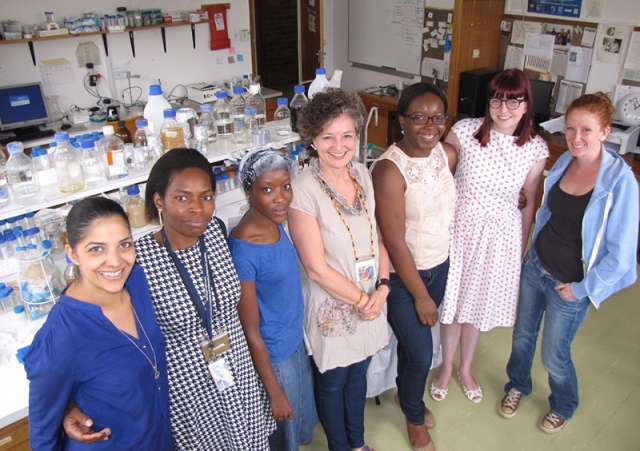Africa explores cassava potential

Cassava is a crop that is crucial to food security for millions of Africans but now some countries on the continent are considering the potential of the shrub for industrial purposes, says Wits Professor Chrissie Rey.
Rey, a professor at the School of Molecular and Cell Biology at the University, has been studying cassava, among other crops, since the 1980s. Cassava is said to be the fourth most important food crop in the sub-tropical regions of the world.
"The main thrust of cassava in South Africa is for industrial purposes and the use of biotechnology to improve the crop for agro-processing. Other countries have always been interested in cassava for food security but there is a trend that all cassava growing countries are getting interested in the industrial potential of cassava," said Rey.
Cassava is a versatile crop and used in different products including flour, paper, textiles, food additives and animal feed. Rey said she studies the plant because its high starch content in its roots makes it a valuable source of starch. "The need for root-based starch will rise in the next 50 years. Cassava is a potentially valuable crop and the South African government is interested in exploring that potential for small-scale and commercial farmers," said Rey.
The crop is also used to produce bio-ethanol which is being used in small stoves instead of paraffin. The bio- ethanol produced from cassavas is cleaner for the environment, according to Rey. Cassava is also used to make beer. SAB Miller launched its cassava beer brand, "Impala", in Mozambique and "Eagle" in Ghana in recent years.
In South Africa, cassava grows in KwaZulu-Natal, the northern part of Limpopo and in Mpumalanga. Rey said that the interest in cassava lies in the potential contribution to the bioeconomy strategy. Cassava is not a food security issue in South Africa because we do not eat the crop, but it also has potential in the food industry.
Recently the Department of Trade and Industry (DTI) recognised cassava as a commodity and also registered the Cassava Industry Association in the Southern African Development Community (CIASA).
"Now that cassava is an official commodity, people who want to start-up businesses with cassava- we are looking at industrial applications of cassava – prospective business opportunities or proposals can be taken to the Technical Innovation Agency or DTI. Government now may fund such endeavours because it is one of its priority projects," said Rey.
Rey added that she would like to see small and large commercial scale farmers growing cassava and making money and a living. "It has lots of potential but there are lots of things that need to be to done to make cassava competitive in terms of commercialisation. CIASA will be facilitating a five year strategic plan to look at various marketing, financial, cultivation and agro-processing aspects.
Last year, Rey was featured in a book, Blazing a Biotechnology Trail, which celebrated the work of twenty five scientists in health, industry and agriculture for their contribution to biotechnology in South Africa. Rey's chapter was titled Cassava: a solution to food security in Southern Africa.
The book was published by the Public Understanding of Biotechnology, a programme launched by the Department of Science and Technology to recognise excellence in South African Biotechnology.
Rey, a plant virologist, also does basic research on the cassava mosaic disease (CMD) which affects a significant portion of crops grown in Africa.
She also has genetically engineered cassava which she is testing. "I genetically engineered them to try and be resistant to the virus that causes CMD."
She is busy with a long term genomics project from a bio chemistry point of view that seeks to provide a solution to CMD. She explained that she looks at which genes get hijacked by the virus and then attempts to find a way to control it using the natural mechanisms of the plant.
In Blazing a Biotechnology Trail, Rey explained that she has a "promising transgenic lines currently being tested for resistance to one of the cassava viruses in greenhouse trials".
"I work on a group of virus called the geminivirus that infects lots of different and important types of crops such. The geminivirus also affects cassavas," she said.
"We are trying to look at the natural mechanisms in plants that defend themselves against the virus but then the viruses evolve or mutate to overcome that.
"We are attempting to understand the interaction of the between the viruses and plants' genes. We are looking at virus host interaction and if we can understand the molecular basis of that we can try an engineer plants to be immune to the viruses," she said.
"We are planning to do large cassava trials with the Technical Innovation Agency (TIA), which is part of the DST around the country trying to grow cassavas to see which plants grow well," said Rey.
Rey will not be directly involved in the trials but will be testing some of the material to see how they respond to virus infections.
Rey supervises a host of masters and PhDs students. Her students come mainly from Mozambique, Uganda and Tanzania. There are also students from Malawi and Zimbabwe. While they spend some time at Wits, most of the projects the students study are based in their home countries.
It is a full circle for Rey considering that she completed her PhD degrees at the Wits in Microbiology and Plant Pathology. She was also the Head of the School of Molecular and Cell Biology for 10 years.
Provided by Wits University














.jpg)





